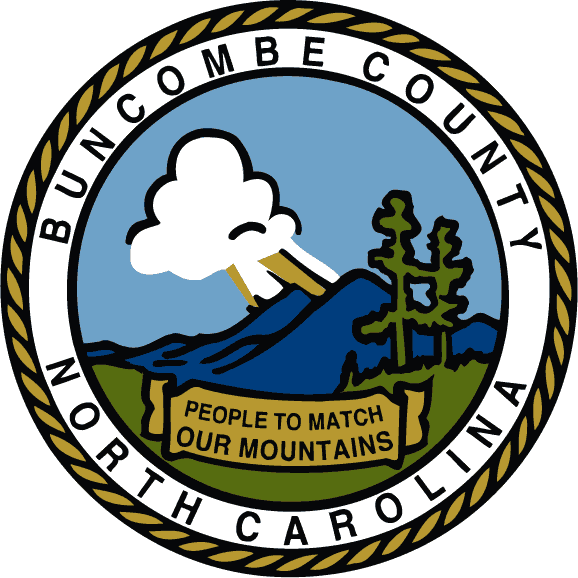Nearly two years after the Buncombe County Board of Commissioners set a goal for government operations to run on 100% renewable energy by 2030, the county is ready to step into the sun. At the board’s regular meeting at 5 p.m. on Tuesday, Nov. 5, in room 326 at 200 College St., commissioners will consider approving a more than $2.9 million request for proposals to place solar panels at county facilities.
According to a presentation available before the meeting by Jeremiah LeRoy, the county’s sustainability officer, 14 Buncombe facilities would be slated for the solar installations. The largest system, to be placed on Buncombe’s Health and Human Services Garage at 40 Coxe Ave., would have a capacity of 243 kilowatts and come at a cost of roughly $730,000. The projects are estimated to generate more than $4.7 million in energy savings over their estimated 30-year operational lifespan.
LeRoy notes that the county will issue its RFP in conjunction with the city of Asheville, A-B Tech and local school systems to achieve the greatest economy of scale from bidders. If commissioners approve the project, analysis of potential sites would wrap up by December, with the RFP itself issued in January and construction commencing by spring.
During an Oct. 15 pre-meeting of the board, LeRoy told commissioners that these solar projects, combined with existing energy efficiency projects and a 5 megawatt solar farm planned for a retired landfill in Woodfin, would meet just 25% of the county’s internal energy goal. A joint city-county study published in July concluded that Buncombe would have to meet over half of that goal through the purchase of renewable energy credits, a method that has drawn criticism from local sustainability activists.
And during the board’s Oct. 15 regular meeting, Commissioner Mike Fryar accused Chair Brownie Newman, a co-owner of Headwaters Solar, of improperly directing LeRoy on solar initiatives. “I’ve got a whole folder full of stuff with you and Jeremiah,” Fryar said, gesturing to a collection of printed emails. “We’re not supposed to instruct staff of what to do — I don’t, but you sure do.”
“I’ve made it no secret that I’m an advocate for clean and renewable energy, and I’ll support that as long as I’m here,” Newman responded.
In other business
Commissioners may put an end to long-running angst over the county’s agreement with residential waste collection contractor Waste Pro through a series of contract modifications. Customers with bear-resistant containers complained that they would be required to purchase new carts, while some elderly residents said the new receptacles were too large and heavy for them to handle, particularly in rural areas.
Dane Pedersen, the county’s solid waste director, addressed both issues in a presentation available before the meeting. Residents with certain bear-resistant carts will now be able to trade them in to WastePro for a discount on leasing a new cart, while up to 700 elderly, low-income residents with a “difficult driveway” will receive free premium service. In exchange for offering that service, valued at $210,000, Waste Pro will now be eligible to receive county a rebate of $4 per ton on residential waste.
The board will also be asked to provide nearly $29,000 from its federal transit grant funding to support the extension of a city bus route into the county along Leicester Highway. Commissioners were reluctant to back the proposal when it was initially discussed last year; the new route is part of the city’s Transit Master Plan, which Asheville officials have struggled to fund since its July 2018 adoption.
Following up on a discussion from the board’s Oct. 15 regular meeting, commissioners will vote on a series of changes to the county’s nonprofit grant process. Rachael Nygaard, Buncombe’s director of strategic partnerships, said the new rules would make funding decisions more transparent and equitable for area organizations.
Consent agenda
The board’s consent agenda for the meeting contains nine items, which will be approved as a package unless singled out for separate discussion. Highlights include resolutions to:
- Accept nearly $13,000 in federal grant funding to purchase “ballistic helmets and armor systems” for deputies of the Buncombe County Sheriff’s Office. According to the grant award letter, that money can be spent on a variety of local crime prevention and control measures, including crime victim and witness support, drug treatment and mental health programs.
- Combine three previously approved county building exterior renovation projects into a single project with a total budget of nearly $6.6 million. The first of those projects was budgeted in July 2017, with two others budgeted in July 2018; to date, the county has spent a total of about $115,000 — less than 2% of that allocation — toward design services for the projects.
- Waive a $300 penalty for late payment of occupancy tax assessed for the Hill House Bed & Breakfast. In a Sept. 26 letter to the Board of Commissioners and the Buncombe County Tourism Development Authority, Hill House owner David Raphael Smith said he paid the tax two days after the Sept. 20 deadline because he was unable to access the county’s website while traveling in Brussels, Belgium.
The commission will hold a pre-meeting at 3 p.m. in the same location. The full meeting agenda and supporting documents can be found at this link.




Give that money to the poorest people to install solar on their homes instead of trying to save itself money ( buncombe county).